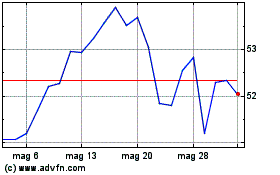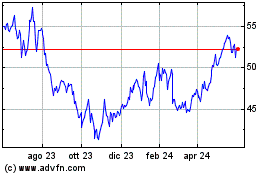WPP Shares Plunge on Worst Results in Years -- Update
01 Marzo 2018 - 10:32AM
Dow Jones News
By Nick Kostov
WPP PLC shares tumbled 12% Thursday after the company logged its
worst year since the financial crisis and forecast no growth for
2018, a further sign of the heavy toll of advertising's digital
revolution.
The world's largest ad company said it is setting budgets this
year on the assumption that both revenue and net sales will be
flat. For 2017, net sales were down 0.9% on a like-for-like basis,
against a forecast they would be "broadly flat."
The company said it is simplifying its unwieldy structure,
accelerating its development from a group of individual companies
to a "cohesive global team."
Like other big ad firms, WPP is grappling with the slowest
revenue growth since the financial crisis as previously big
spending consumer-good companies keep a tight lid on marketing
budgets. That slowdown in growth has pressured agency holding
companies to revamp an organizational structure that has gone out
of style.
"There are two things going on: technological change, and the
second is short term pressures, whether it be zero-based budgeting,
activists or private equity," Mr. Sorrell said in an interview with
The Wall Street Journal.
"We're clear on the destination," Mr. Sorrell said. "The changes
that are taking place are pushing us to do it faster."
Big ad firms built their businesses over the years by acquiring
different specialists with their own ways of working and separate
finances. Now there has been a move across the industry to align
the different agencies closer together to allow clients to better
access resources across their groups and cut costs. WPP executives
often refer to its approach as "horizontality."
The company, which owns creative and media agencies such as J.
Walter Thompson and Ogilvy & Mather, reported a 1.3% decline in
fourth-quarter organic net sales, a closely watched metric in the
industry that excludes currency effects and acquisitions. That
growth rate was below analysts' expectations of a roughly 0.7%
rise.
In the fourth quarter, organic net sales were down 3.4% in North
America, declined 2.6% in Western Continental Europe and dropped 3%
in Asia Pacific. The bright spot was the U.K., which rose 9.1%.
WPP's closest competitors have been facing similar headwinds.
France's Publicis Groupe SA posted organic growth of just 0.8% last
year, while Omnicom Group Inc. posted lackluster fourth-quarter
revenue, blaming a pullback by marketers on project work, losses at
some independent-branded agencies and softness in its programmatic
business.
Omnicom's longtime CEO, John Wren, said he expects the company
to post softer organic growth this year compared with 2017 because
of challenges in the marketplace like changes in technology,
shareholder activism and new competitors.
The overall outlook for Madison Avenue remains cloudy. Ad
companies are dealing with major slowdowns in industries that they
have long relied upon for growth, such as consumers-goods giants
and retailers. Those sectors are putting additional pressure on ad
firms to reduce the fees they pay for services.
The slowdown in advertising spend has affected agency sector
organic growth, which has slowed from 4.5% in 2015 to 1.9% in 2016
and to an expected 1.1% in 2017, UBS analysts wrote in a note this
week.
In their note, the analysts cited a long list of challenges that
the sector is facing, including marketers experiencing slower
growth, companies continuing to cut the fees they pay agencies, and
growing competition from consulting firms. Another challenge has
been brands cracking down on nontransparent practices in the
ad-buying sector, which industry observers say has squeezed holding
company margins.
Write to Nick Kostov at Nick.Kostov@wsj.com
(END) Dow Jones Newswires
March 01, 2018 04:17 ET (09:17 GMT)
Copyright (c) 2018 Dow Jones & Company, Inc.
Grafico Azioni WPP (NYSE:WPP)
Storico
Da Giu 2024 a Lug 2024

Grafico Azioni WPP (NYSE:WPP)
Storico
Da Lug 2023 a Lug 2024
